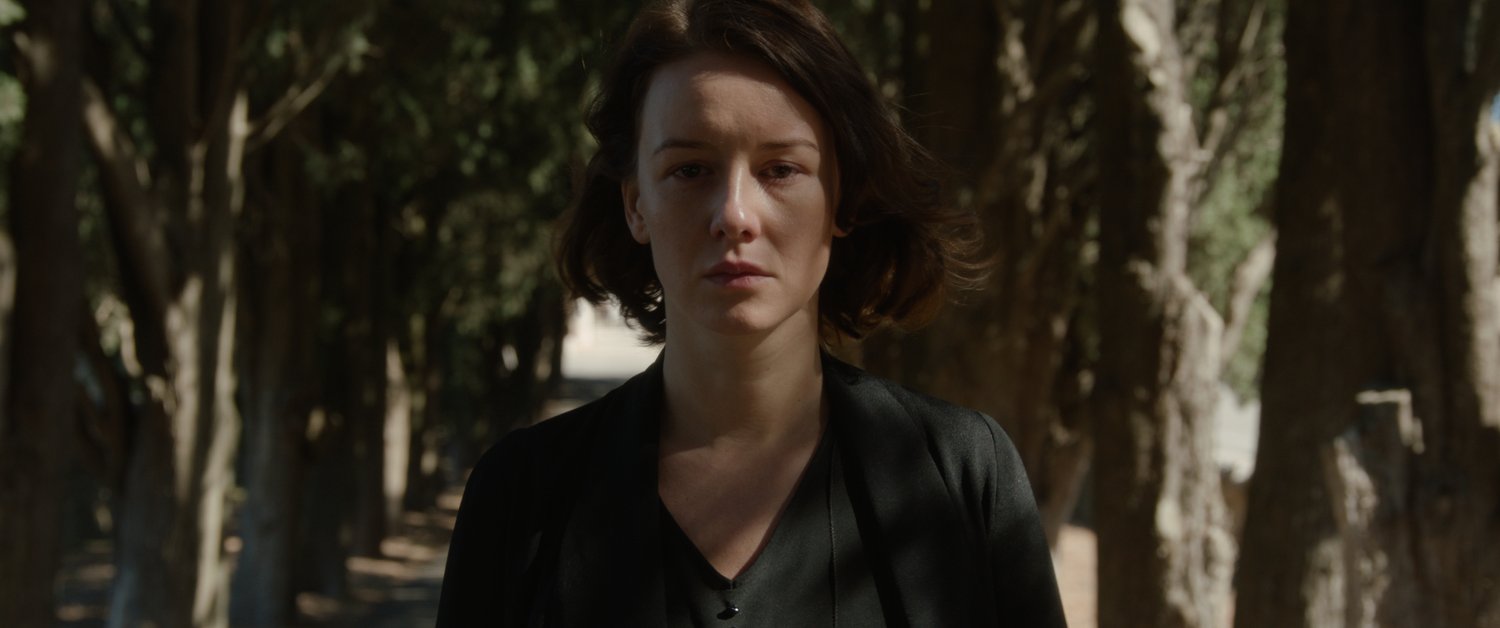Images courtesy of Greenwich Entertainment
SHOSHANA— 3 STARS
Shoshana encircles complicated relationships within even more complicated actual times. Directed by acclaimed English filmmaker Michael Winterbottom, a noted lover of history himself across his well-regarded vitae, the film opens on a documentary-style primer running through the opening credits. Narrated by the title character, journalist Shoshana Borochov, played by award-winning Russian actress Irina Starshenbaum, the exposition outlines the governmental history of Palestine taking shape after the turn of the 20th century. From this introduction, Shoshana shows its genuine care for the history behind its dramatization.
LESSON #1: SIT DOWN FOR A HISTORY LESSON— The credits set the time period of the British assuming control of what was then called Mandatory Palestine after the conclusion of World War I and the Arab uprising against the Ottoman Empire in 1916. During this time, with the establishment of a new Jewish homeland, Israel saw uninterrupted surges of Jewish immigration and nationalist movements, particularly the Zionist movement. By the late 1930s, with a second World War nearly imminent in Europe, the contentiousness and reprisals between Jews, Arabs, and the stewarding Brits turned violent. The martyrdom of Shlomo Ben-Yosef, the Revisionist Zionist member and first Jew executed by the British authorities during this new regime, concludes Shoshana’s introduction and stands as the crest of the Palestinian Revolution.
In what would continue for the length of Shoshana, the efficient screenplay from Winterbottom and co-screenwriters Laurence Coriat (Everyday) and Paul Viragh (Sex & Drugs & Rock & Roll) constructs a steady journey of recreated and reenacted events. Depending on the sides doing the judging, each faction, including the British who are supposed to be upholding civility, can be seen as invasive immigrants, senseless, ignorant, or the more callous instigator or aggressor. Unshly, Shoshana shows thefts, bombings, shootings, targeted assassinations, and espionage tactics conducted by several parties and their bloody aftermath. The cinematography of Giles Nuttgens (Hell or High Water) is not squeamish, yet viewers, likely considering the still-present and divisive upheaval that stands to this day in the region, may wonder which lens is being granted the most favoritism in Shoshana, especially considering Winterbottom’s British roots.
LESSON #2: STICK TO ONE LENS— Tip-toeing stances at some times and completely side-stepping at other moments, the answer to that lies in the title—a woman no less, bucking plenty of prior trends. Through it all, Shoshana uses the titular historical figure as its guide during this tumultuous era because her unique position intersects the British perspective and the Jewish cause. At this time, Shoshana Borochov was working as a journalist in Tel-Aviv trying to equalize the propaganda advantage with her editor Ezra (TV actor Ofer Seker). Her father, Ber, was one of the prominent socialist Zionist founders, and that reputation follows her into her membership with Haganah, the topmost Zionist military organization.
LESSON #3: KEEP YOUR FRIENDS CLOSE AND YOUR ENEMIES CLOSER— True to the old Sun Tzu quote of this lesson, the British connection and angle for Shoshana is a personal one. After meeting at a Purim party laden with government guests, she begins a romantic relationship with Thomas Wilkin (Douglas Booth of Pride and Prejudice and Zombies), a handsome and diligent British member of the Palestine Police Force. As tensions rise, Tom is promoted to serve in Tel-Aviv’s British Intelligence headquarters, a position that carries a label of being a dangerous enemy. Working as the second-in-command deputy for Assistant Superintedent Geoffrey J. Morton (emerging professional movie villain Harry Melling of The Old Guard and the Harry Potter franchise) and regimented latitude of weapons laws, his department’s chief target for arrest becomes the elusive Irgun paramilitary leader Avraham Stern, portrayed in an intense manner by House of David actor Aury Alby.
Much of Shoshana filters the happenings of this search and ongoing resistance through the day jobs of Thomas and Shoshana. Thomas bears witness to the police’s own shady methods of torture and interrogation and is weighed down by the risk and stress of the conflict. The Hebrew-fluent—thanks to Shoshana—Wilkin seeks neutrality and considers Tel-Aviv more his home than England, which slants him more peace-minded than most of his uniformed peers. Likewise, Shoshana struggles with the divisional splits within the Jewish community between those who favor or disapprove Stern’s questionable and likely fascist tactics.
Together, the two are true lovers, doing their best to “leave work at work,” to shield the other and never exploit each other for informational gain. Suspensefully, the union of Thomas Wilkin and Shoshana Borochov complicates their respective allegiances as matters get worse. In the public eye, both are chided and lambasted for their choice of partner. The “traitor” labels are bandied about in Shoshana from all sorts of directions, all waiting for the next proverbial bomb to drop or shot fired. Alas, as one line of dialogue in the film portends, “Everyone kills their traitors.”
Led by Shoshana’s passion and graced by a surprisingly low-key score from Ocean’s trilogy composer David Holmes, the bedroom becomes the neutral ground for the drama of Shoshana as a place of solace and release. Across their shared scenes at Wilkin’s apartment conducting pillow talk or clutching each other on dance floors or hand-in-hand on the streets, Starshenbaum and Douglas Booth generate adequate connection, while providing an united human anchor to root for as a break from the outside horrors. Overall, the depiction of their relationship does not quite reach the emotional fever pitch it would take to create the higher, compelling swoon to shatter hearts.
As a whole, Michael Winterbottom took on a very difficult slice of history, with many facets and fractures that pit “our land” versus “promised land,” and chose an observant path over a declarative one. In one regard against that arms-length of safety, more terse politics were possible, and probably preferred with this many decades of reflection since the Palenstinian Revolution. The decision not over-project is understandable. Nevertheless, the film is truly in Irina Starshenbaum’s hands. Her grip is both respectful and strong in a very well-composed performance, something she is very proud of as a Jew herself. Watching her stoic poise is the most impressive outcome of Shoshana.
LOGO DESIGNED BY MEENTS ILLUSTRATED (#1329)



